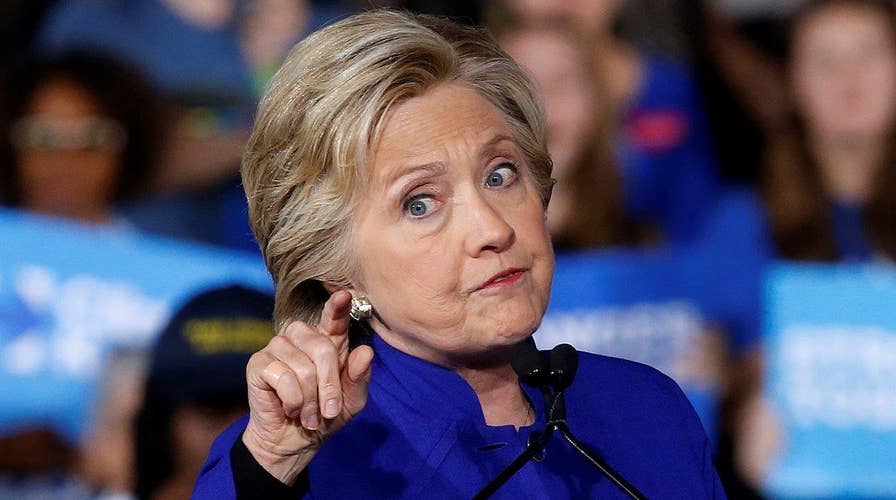Whistleblower: Clinton team skirted security rules
Catherine Herridge reports from Washington, D.C.
John Podesta was willing to discuss sensitive information with future boss Hillary Clinton while he worked for President Obama and she was a private citizen in August 2014 – but he knew better than to send the intel over Clinton’s private server from his Gmail account, emails released Thursday by WikiLeaks show.
In the exchange, Clinton, who had resigned as secretary of state 18 months earlier, asked then-Obama counselor Podesta if he knew who was responsible for an Aug. 18 airstrike in Tripoli, in which unidentified bombers blew up an Islamist-controlled arms depot in the Libyan capital.
“Yes and interesting but not for this channel,” Podesta replied in the Aug. 19, 2014 message to Clinton’s hrod17@clintonemail.com account.
DOJ OFFICIAL GAVE CLINTON CAMP 'HEADS UP'
The conversation appears to show that Podesta, now Clinton’s campaign chairman, was willing to provide Clinton information that had not been made public. Reports from The New York Times and The Associated Press at the time included denials of involvement from the U.S., France, Italy and Egypt and debunked claims of responsibility from a rogue Libyan general.
Podesta, in his email response, indicated he had his own sources. But he also apparently recognized he shouldn’t share the information over their personal accounts. It's unclear if he was concerned more about the security on her clintonemail.com account or his Gmail account -- which would be hacked months later, in turn exposing the email chain Thursday.
And in 2015, the discussion of sensitive and now-classified information on the Clinton server would be at the heart of the FBI probe. Further, FBI Director James Comey's decision in July not to pursue charges for the transmission of classified material on the server was rooted in a determination that Clinton did not intend to break the law.
Podesta’s concern could show that at least one close Clinton ally was aware of the risk of sharing sensitive or classified information over the unsecured server.
Two sources told Fox News on Thursday that authorities believed there was a 99 percent chance that as many as five foreign intelligence agencies had hacked the secret server Clinton’s email account was hosted on. Judicial Watch on Tuesday also released documents showing that State Department IT official Bryan Pagliano told Clinton aide Justin Cooper in 2010 that Clinton’s server had likely been the target of “an injection attack” and the system was “susceptible to such an attack.”
The FBI on Friday announced it had reactivated the Clinton email investigation, after discovering new emails.
Podesta’s August 2014 correspondence with Clinton was part of a trove hacked from his Gmail account and posted by WikiLeaks. Also included among those messages was an email from Jennifer Palmieri, who later became Clinton’s communications director, showing coordination with the White House press office regarding Clinton’s private email account just seven days after the story broke.
In an email to future Clinton campaign manager Robby Mook on March 9, 2015, Palmieri, who previously served as White House communications director, noted she had not personally had any communication with the White House “about emails.”
“Think that is cleaner for both sides,” she wrote.
However, Palmieri advocated others within Clinton’s unofficial campaign team make contact.
“Told Eric he should call [longtime Clinton aide] Philippe [Reines] to help with prepping Josh,” Palmieri wrote, ostensibly referring to White House Press Secretary Josh Earnest.
The coordination between the White House and Clinton’s team doesn’t appear to be an isolated incident.
Podesta emails released earlier this week also showed at least two instances of officials within the Justice Department tipping off the Clinton camp about court filings and congressional hearings. Other emails revealed apparent coordination between Team Clinton and the State Department.
State Department spokesman John Kirby said Wednesday that in an effort to “provide accurate information to the media” about Clinton, the department “at times required communicating with her representatives to ensure accuracy.”
A Justice Department spokesman on Wednesday downplayed the significance of that department’s leaks, saying it was “about public information” and at least one of the emails was sent in a “personal capacity, not during work hours.”

























